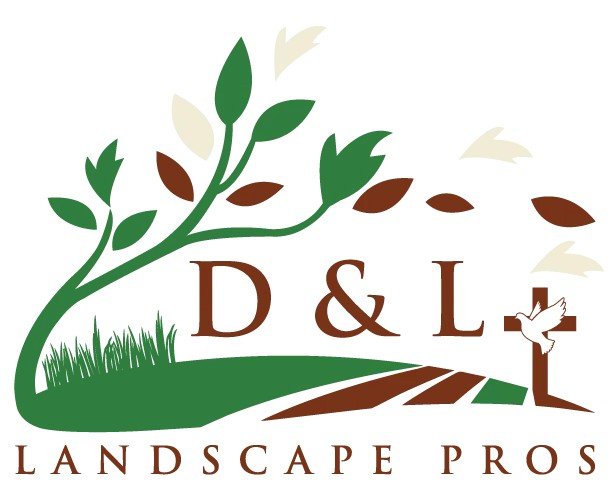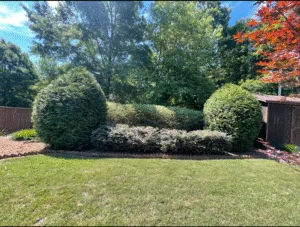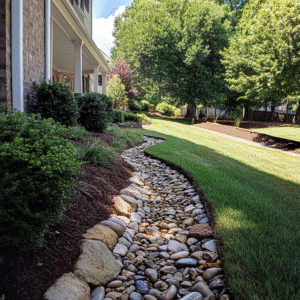Your lawn is more than just grass—it’s a place to relax, entertain, and enjoy your outdoor space. But if you’re a pet owner, you’ve likely noticed brown spots, uneven growth, or compacted soil caused by your furry friends. In Monroe, South Charlotte, Matthews, Indian Trail, Ballantyne, Mint Hill, and Waxhaw, homeowners face the challenge of maintaining healthy lawns while allowing their pets to enjoy the yard freely. With the right approach, you can protect your lawn from damage while keeping your dog happy.
Whether you’re dealing with urine burns, digging, or heavy foot traffic, D & L Landscape Pros specializes in lawn care, sod installation, and landscaping services that help homeowners restore and maintain beautiful yards. In this guide, we’ll cover practical strategies to prevent pet damage, repair existing issues, and create a lawn that thrives year-round.
Common Causes of Pet Damage on Lawns
Before addressing solutions, it’s important to understand why pets can cause damage:
- Urine Burns: Dog urine contains high nitrogen levels, which can burn grass and leave unsightly brown spots. Small dogs may create concentrated spots, while larger dogs can cause more extensive damage.
- Digging: Dogs instinctively dig to play, explore, or create a cool spot, which can uproot grass and disturb soil.
- Soil Compaction: Frequent running, jumping, and playing can compact soil, making it harder for grass roots to access water and nutrients.
- Heavy Traffic Areas: Pets often create worn paths in popular areas like entrances, fences, or near food bowls, leading to bare or patchy spots.
- Pests and Disease Transfer: Pets can introduce pests like fleas or spread fungal diseases from other areas, which can affect grass health.
By understanding these causes, you can implement strategies that protect your lawn and maintain healthy growth throughout the year.
Lawn Maintenance Tips for Pet Owners
Regular maintenance is key to a resilient lawn. Homeowners in Monroe, South Charlotte, and surrounding areas can benefit from these practices:
- Water Your Lawn Properly: Keeping your lawn well-watered helps dilute nitrogen from pet urine and reduces brown spots. Early morning watering is best, as it allows grass to dry and prevents disease.
- Mow at the Right Height: Taller grass helps shade soil, reduces stress from foot traffic, and encourages deeper roots. For North Carolina lawns, maintaining grass at 2.5–3 inches is ideal.
- Aerate Compacted Areas: Regular lawn aeration allows water, nutrients, and air to penetrate the soil. In areas where pets run frequently, consider aerating more often to prevent soil compaction.
- Fertilize Carefully: Use a balanced fertilizer to strengthen grass and promote recovery from pet damage. Avoid over-fertilizing, as high nitrogen levels can worsen urine burns.
- Rotate High-Traffic Zones: Encourage pets to use multiple areas of the yard to prevent overuse of a single spot. This may include installing a dog-friendly path or creating designated play areas.
Repairing Pet-Damaged Lawns
Even with preventive measures, some damage may occur. Repairing your lawn promptly ensures it recovers quickly. Homeowners in Monroe, South Charlotte, Matthews, and Indian Trail can use these strategies:
- Overseed Brown Spots: Remove dead grass and loosen soil before reseeding. Use grass varieties suited for North Carolina climates, such as Bermuda or Zoysia.
- Install Sod for Immediate Results: For larger damaged areas, sod installation provides instant coverage and reduces the risk of weeds taking over.
- Soil Amendment: Test your soil for nutrient deficiencies and pH imbalances. Adding compost or soil conditioners can improve grass health and durability.
- Topdressing: Apply a thin layer of soil or sand to compacted areas to improve drainage and encourage root growth.
By combining these techniques with regular maintenance, you can restore your lawn’s health while continuing to enjoy your pets.
Pet-Friendly Landscaping Ideas
Creating a pet-friendly yard not only protects your lawn but also enhances your outdoor space. Consider these strategies for Monroe, South Charlotte, Ballantyne, and Mint Hill properties:
- Designated Play Areas: Set aside a section of your yard for your dog to run and play, reducing wear on grass elsewhere. Gravel or artificial turf can be durable alternatives for high-traffic zones.
- Mulched Beds and Borders: Use mulch around trees, shrubs, and flower beds to create boundaries that protect plants while allowing pets to roam freely. Pine mulch works well in North Carolina yards.
- Pathways and Hardscape Zones: Install flagstone walkways or paver paths for pets to navigate without damaging grass. These areas can also reduce soil compaction.
- Dog-Friendly Plants: Avoid toxic plants and select hardy, resilient species that can tolerate occasional pet activity. Consider ground covers or ornamental grasses in high-traffic areas.
- Yard Drainage Solutions: Proper drainage prevents waterlogging and soil compaction, keeping grass healthy even in areas your pets frequent.
Preventing Urine Damage
Urine spots are the most common pet-related lawn problem. Here’s how to minimize them:
- Train Pets to Use Specific Areas: Encouraging dogs to relieve themselves in designated zones reduces stress on the main lawn.
- Water Immediately: Diluting urine with water helps neutralize nitrogen and prevent brown spots.
- Add Lawn Protectants: Certain fertilizers and soil amendments can improve nitrogen absorption and reduce urine burn.
- Encourage Frequent Walks: Taking pets on walks or to designated areas can reduce the frequency of urine concentrated on your lawn.
Choosing the Right Grass Type
For Monroe and South Charlotte homeowners, selecting the right grass can significantly reduce pet damage. Consider:
- Bermuda Grass: Heat-tolerant, resilient, and recovers quickly from wear.
- Zoysia Grass: Dense growth pattern reduces traffic damage and brown spots.
- Fescue Varieties: Shade-tolerant options for yards with trees and varied sunlight.
Professional landscaping services can advise on the best grass type for your soil, traffic levels, and climate conditions.
Regular Yard Maintenance and Care
Routine maintenance is crucial for keeping your yard pet-friendly:
- Mow Consistently: Regular mowing encourages healthy growth and hides minor brown spots.
- Fertilize Smartly: Use balanced fertilizers to strengthen grass without causing excess nitrogen burn.
- Aerate Annually: Aeration reduces soil compaction, especially in areas with heavy pet activity.
- Mulch Garden Beds: Protect plant roots and borders with mulch to keep pets from disturbing flower beds.
By integrating lawn care, sod installation, yard drainage solutions, and landscaping services, homeowners can maintain a healthy, beautiful yard even with active pets.
Professional Landscaping Assistance
If you’re struggling with pet damage, professional help from D & L Landscape Pros can make a difference. We serve Monroe, South Charlotte, Matthews, Indian Trail, Ballantyne, Mint Hill, and Waxhaw, offering:
- Lawn maintenance and restoration
- Sod installation for damaged areas
- Yard drainage solutions to prevent waterlogging
- Shrub planting and mulching
- Custom landscaping plans for pet-friendly yards
Our team combines local expertise, high-quality materials, and proven techniques to create lawns that are resilient, lush, and safe for pets.
Conclusion
Protecting your lawn from pet damage doesn’t mean restricting your dog’s outdoor time. With the right lawn maintenance, sod installation, shrub planting, mulching, and landscaping solutions, homeowners in Monroe, South Charlotte, Matthews, Indian Trail, Ballantyne, Mint Hill, and Waxhaw can enjoy healthy, vibrant lawns year-round.
By implementing preventive strategies, repairing damage promptly, and working with professional landscapers like D & L Landscape Pros, you can achieve a yard that’s beautiful, functional, and pet-friendly. Don’t let brown spots and compacted soil ruin your outdoor space—take action today and protect your lawn for years to come.




